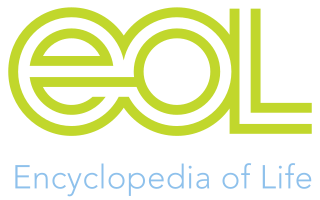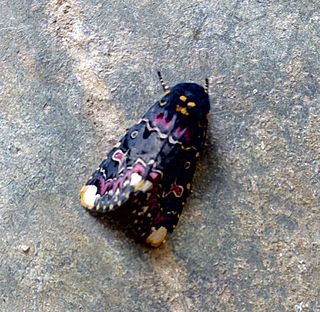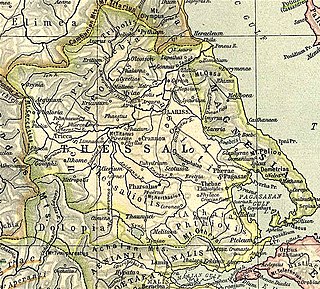Genus is a taxonomic rank used in the biological classification of living and fossil organisms as well as viruses. In the hierarchy of biological classification, genus comes above species and below family. In binomial nomenclature, the genus name forms the first part of the binomial species name for each species within the genus.

Sharks are a group of elasmobranch fish characterized by a cartilaginous skeleton, five to seven gill slits on the sides of the head, and pectoral fins that are not fused to the head. Modern sharks are classified within the clade Selachimorpha and are the sister group to the Batoidea. Some sources extend the term "shark" as an informal category including extinct members of Chondrichthyes with a shark-like morphology, such as hybodonts. Shark-like chondrichthyans such as Cladoselache and Doliodus first appeared in the Devonian Period, though some fossilized chondrichthyan-like scales are as old as the Late Ordovician. The oldest confirmed modern sharks (selachimorphs) are known from the Early Jurassic, about 200 million years ago, though records of true sharks may extend back as far as the Permian.

Tilapia is the common name for nearly a hundred species of cichlid fish from the coelotilapine, coptodonine, heterotilapine, oreochromine, pelmatolapiine, and tilapiine tribes, with the economically most important species placed in the Coptodonini and Oreochromini. Tilapia are mainly freshwater fish inhabiting shallow streams, ponds, rivers, and lakes, and less commonly found living in brackish water. Historically, they have been of major importance in artisanal fishing in Africa, and they are of increasing importance in aquaculture and aquaponics. Tilapia can become a problematic invasive species in new warm-water habitats such as Australia, whether deliberately or accidentally introduced, but generally not in temperate climates due to their inability to survive in cold water.

An argus, or argus pheasant, is a member of a clade in the tribe Pavonini of the family Phasianidae, containing two species of bird that are closely related to peafowl.

The Encyclopedia of Life (EOL) is a free, online encyclopedia intended to document all of the 1.9 million living species known to science. It aggregates content to form "page"s for every known species. Content is compiled from existing trusted databases which are curated by experts and it calls on the assistance of non-experts throughout the world. It includesvideo, sound, images, graphics, information on characteristics, as well as text. In addition, the Encyclopedia incorporates species-related content from the Biodiversity Heritage Library, which digitizes millions of pages of printed literature from the world's major natural history libraries. The BHL digital content is indexed with the names of organisms using taxonomic indexing software developed by the Global Names project. The EOL project was initially backed by a US$50 million funding commitment, led by the MacArthur Foundation and the Sloan Foundation, who provided US$20 million and US$5 million, respectively. The additional US$25 million came from five cornerstone institutions—the Field Museum, Harvard University, the Marine Biological Laboratory, the Missouri Botanical Garden, and the Smithsonian Institution. The project was initially led by Jim Edwards and the development team by David Patterson. Today, participating institutions and individual donors continue to support EOL through financial contributions.

An endangered species is a species that is very likely to become extinct in the near future, either worldwide or in a particular political jurisdiction. Endangered species may be at risk due to factors such as habitat loss, poaching, and invasive species. The International Union for Conservation of Nature (IUCN) Red List lists the global conservation status of many species, and various other agencies assess the status of species within particular areas. Many nations have laws that protect conservation-reliant species which, for example, forbid hunting, restrict land development, or create protected areas. Some endangered species are the target of extensive conservation efforts such as captive breeding and habitat restoration.

Symmorphus is a primarily holarctic genus of potter wasps.within the family Vespidae.

Polytela is a genus of moths of the family Noctuidae erected by Achille Guenée in 1852. Species are distributed across the Old World.
Polytela cliens is a species of moth of the family Noctuidae. It is found through North Africa and the Sahara to Israel, Jordan, the Arabian Peninsula and to southern Iran.
G. orientalis may refer to:

Patronage (clientela) was the distinctive relationship in ancient Roman society between the patronus ("patron") and their cliens ("client"). The relationship was hierarchical, but obligations were mutual. The patron was the protector, sponsor, and benefactor of the client; the technical term for this protection was patrocinium. Although typically the client was of inferior social class, a patron and client might even hold the same social rank, but the former would possess greater wealth, power, or prestige that enabled him to help or do favors for the client. From the emperor at the top to the commoner at the bottom, the bonds between these groups found formal expression in legal definition of patrons' responsibilities to clients. Patronage relationship were not exclusively between two people and also existed between a general and his soldiers, a founder and colonists, and a conqueror and a dependent foreign community.
Camponotus irritans is a species of carpenter ant. It is found in many Asian and Oceanian countries.

Scotussa or Skotoussa was a town and polis (city-state) of Pelasgiotis in ancient Thessaly, lying between Pherae and Pharsalus, near the frontiers of Phthiotis. Scotussa is not mentioned in Homer, but according to some accounts the oracle of Dodona in Epirus originally came from this place. In 394 BCE, the Scotussaei joined the other Thessalians in opposing the march of Spartan king Agesilaus II through their country. In 367 BCE, Scotussa was treacherously seized by Alexander of Pherae, tyrant of the neighbouring town of Pherae.
ALLMOST is a Filipino hip hop group which consists of members Clien Alcazar, Russell dela Fuente, Jomuel "Jom" Casem and Angelo Luigi "Crakky" Timog.
Animal Ethics is a nonprofit organization formed to promote discussion and debate around issues in animal ethics and to provide information and resources for animal advocates. They also do outreach work in several countries on the issue of speciesism. Their aim is to create a world where moral consideration is extended to all sentient beings. The organization's website covers topics such as speciesism, sentience, veganism and wild animal suffering and has content translated into several languages.

Scotussa is a genus of spur-throated grasshoppers in the family Acrididae. There are about seven described species in Scotussa, found in South America.










